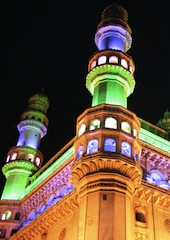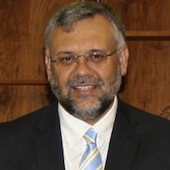Living Where You Don’t Make the Rules (Part I)
Faith and cultural change in the age of globalization.
November 28, 2013

This is part one of a three-part series on Muslims, faith and cultural change in the age of globalization.
One of the touchiest issues in the world today is the Muslim disquiet, especially in countries where Muslims are minorities. We often miss it and call it all kinds of names.
We call it Islamism. We call it radicalism, we call it extremism, we call it fundamentalism and we call it violence. We claim it springs from conflict-driven communities.
Those labels have a semblance of truth in them, because on any given day, some Muslims may display some of those characteristics.
But those labels don’t tell the story about what the causes of the disquiet really are. They don’t even begin to describe how to deal with it and how to manage it. In particular, they don’t tell how to bring peace to the soul of a community that is often uncomfortable in the context of the disquiet.
The existing disquiet, in turn, invites fear, suspicion and often hostility among non-Muslims. In some way, we have to tackle the issue head on. How do we deal with this problem? The way in which I have come to understand it is that the key lies in the theological assumptions of the Muslim community that were formed in times of dominance.
When Islam was an empire, when Muslims were the rulers and when they moved into Spain, they made theological assumptions about how they could live. They created the rules for how to engage with those who are non-Muslim (and how those others could live). That set the tone of the lifestyle that they could lead.
Muslims in the minority
Now there are a whole host of countries where there are sizable Muslim populations – but where Muslims are in a minority. Rather suddenly (in historical terms), there are a few million Muslims in South Africa, a few million in the United States, a few million in Europe and hundreds of millions in India. Because they are not the majority, they are not dominant.
The idea of having a traditional set of rules and precepts – and not being able to live by those rules in full and with regard to shaping all aspects of public life – is one of the most unsettling things for Muslims.
I speak from experience: I am a Muslim who grew up in Johannesburg, South Africa. Not living by one’s traditional rules makes us feel that we are not respected for being given time off when the call to prayer is made.
Muslims feel disrespected for being compelled to work at lunchtime on Fridays – when we should be in mosques. Similar issues arise when choosing to abide by the dress codes we have inherited, by Halal diets or by customs like not shaking women’s hands.
Together, these things become a phenomenon that manifests itself often very emotionally.
How do we help manage this phenomenon of living where you don’t make the rules? Well, it’s not only Muslims who live in a world where they don’t feel respected, where their rules don’t count and where they don’t even have the closeness to power in order to set them.
We live in a fundamentally uncertain world and we can either rail against that uncertainty – or we can embrace it.
Sell your cleverness and buy bewilderment
I was fascinated in the “Masnavi” – the poem written in Persian by Jalal al-Din Muhammad Rumi – when the great Rumi writes, “sell your cleverness and buy bewilderment.”
That speaks to us: sell your cleverness, your ability to know all the answers, your ability to be certain, your ability to plot a graph of how you will progress, your ability to know things. Sell that cleverness and buy bewilderment.
Learn to enjoy being bewildered, learn to embrace uncertainty, give up the black and white areas of life and enter the gray area. Master all the creativity and the innovation, all the fascination of not knowing.
Rumi doesn’t merely say to buy bewilderment. He doesn’t leave us up a creek without a paddle.
Rumi also says to us, “As you start to walk out of the way, the way appears. It is often when we are afraid of the dark that we get trapped in what we know. We are afraid of the unknown, so we only want to be with those who look like, eat like, think like, pray like and dress like us.”
But as Rumi says, the moment that you actually set out on the path of the unknown is when the path begins to appear. It doesn’t appear to those who want to see it from a safe haven. And it doesn’t appear to those who know they must be on the path, but are afraid of the first step.
The path only appears when you embrace bewilderment and you let your curiosity get the better of you. And you begin to build courage in order to go out on this path.
How do we apply those very profound philosophical precepts of selling cleverness and buying bewilderment to our lives as a minority population?
Globalization = Equal Opportunity Discriminator?
Through the condition of the world, through globalization, all of us have had to cede some of our knowledge, certainty, power, decision-making and rules. With all that, we have even had to cede autonomy and sovereignty.
We live in a world that has produced more wealth and more growth than ever before in the history of humankind. Yet, this world has had the unintended consequences of greater poverty and greater inequality.
We live in a world where there is so much technology, but often at the expense of the natural world and the environment. We live in a world where one can access so much information and knowledge at the click of a button on a phone.
Yet, we have gained those crisp new insights at the expense of traditional systems, traditional knowledge, faith-based knowledge, culture and other things that have been the anchors in the lives of people all along.
And so suddenly entire faith communities find that every supposition on which their life has been based is questioned. Every value they held dear suddenly appears less valuable.
We live in a world where capital and goods are instantly mobile. One can press a button now and billions of dollars can flow from one continent to another. We load fresh fish onto an airplane in South Africa and serve it in a London restaurant 12 hours later.
Yet, when people are mobile, want to follow capital and want to follow goods where they are abundant, we don’t know how to handle their mobility. We call them immigrants, migrants or aliens. We make them “the other.”
So this world that holds so much promise, potential, wealth and so many material things is at the same time a world that creates so much uncertainty, fear, hopelessness, despair and so many mental problems. This world breeds troubled mindsets.
Takeaways
What is behind what we call Islamism, radicalism, extremism, fundamentalism and violence?
Muslims’ disquiet invites fear, suspicion and often hostility among non-Muslims.
Muslims are in a minority in South Africa, the US, Europe and India.
I speak from experience: I am a Muslim who grew up in Johannesburg, South Africa.
It’s not only Muslims who live in a world where they don't feel respected, where their rules don’t count.
We live in an uncertain world and we can either rail against that uncertainty – or we can embrace it.
The theological assumptions of the Muslim community were formed in times of dominance.
When Muslims were the rulers, they created the rules for how they engage with those who are non-Muslim.
Give up the black and white areas of life. Master the creativity, innovation and fascination of not knowing.
Through globalization, all of us have had to cede some of our knowledge, certainty and rules.
We have gained some new insights at the expense of traditional systems and faith-based knowledge.
Read previous

Secular Stagnation in the West?
November 27, 2013
